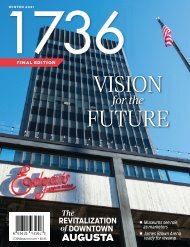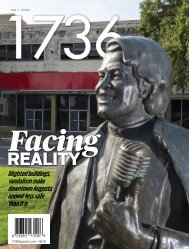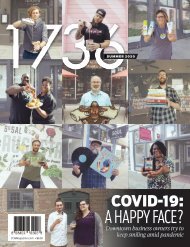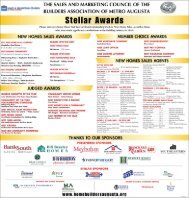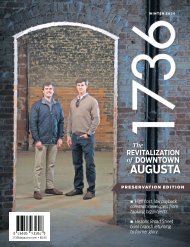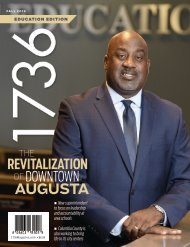1736 Magazine - Fall 2018
You also want an ePaper? Increase the reach of your titles
YUMPU automatically turns print PDFs into web optimized ePapers that Google loves.
TURNING BACK<br />
THE BLOCK<br />
Nonprofit takes methodical<br />
approach to revitalizing Harrisburg<br />
By Damon Cline<br />
PHOTO BY DAMON CLINE<br />
Marty Rose is turning<br />
his life – and<br />
his neighborhood –<br />
around one day at a<br />
time.<br />
The once homeless<br />
and drug-addicted Pennsylvania native<br />
keeps his body and his home on Metclaf<br />
Street clean, becoming an exemplar<br />
of virtuous living in the heart of<br />
Harrisburg, a community with a reputation<br />
for vice.<br />
The 58-year-old registered nurse,<br />
one of 10 Turn Back<br />
the Block homebuyers,<br />
preaches the dignity<br />
of homeownership in<br />
a neighborhood where<br />
nearly 80 percent of his<br />
neighbors are renters.<br />
“It’s not just a home,”<br />
Rose said. “It allows you<br />
to become a productive<br />
citizen again who feels<br />
worthwhile. It’s a renewal<br />
of life.”<br />
Rose’s second chance at life is precisely<br />
the outcome Turn Back the Block<br />
is looking to achieve in Harrisburg.<br />
The faith-based nonprofit is revitalizing<br />
the historic neighborhood by rehabilitating<br />
dilapidated or vacant properties,<br />
which it then makes available to<br />
people who ordinarily wouldn’t qualify<br />
for a mortgage.<br />
It’s not just a<br />
home.<br />
Marty Rose<br />
The once stable and working-class<br />
neighborhood of Harrisburg fell into<br />
disrepair with the demise of the city’s<br />
textile industry, where many residents<br />
were employed. The nearly decade-old<br />
Turn Back the Block was created to<br />
restore the district’s luster one block<br />
at a time.<br />
“We’re about creating pride in<br />
homeownership and promoting that<br />
neighborhood concept,” Executive<br />
Director Lauren Dallas said. “It’s that<br />
‘I’m going to mow my lawn because<br />
my neighbor mows his’<br />
sort of thing.”<br />
It’s a simple concept<br />
that appears to be working<br />
on the blocks where<br />
the organization has<br />
focused. Rose’s house,<br />
which sits next to a family<br />
cemetery plot, was a<br />
hangout for prostitutes<br />
before his home and the<br />
two next door were rehabilitated.<br />
The organization operates largely<br />
on donated money, labor and building<br />
materials, which enables them to<br />
complete about two homes per year.<br />
Dallas declined to disclose the number<br />
of properties the organization has purchased,<br />
but said it is in the “dozens.”<br />
She brushes aside concerns of gentrification<br />
because most of the homes<br />
<strong>1736</strong>magazine.com u 41



